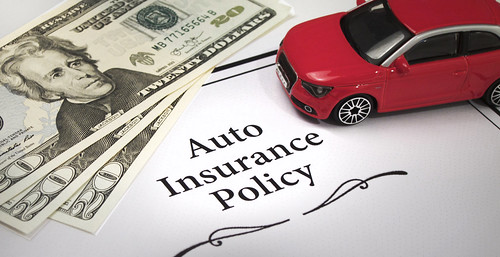Auto insurance covers you if you ever get into a car crash. It can offset expenses resulting from legal bills, vehicle repairs, and medical bills from injuries. Like most states, Illinois has laws governing the minimum required amounts that each driver must carry in liability insurance, covering damages caused by an accident in which you were at fault. In addition, if you have a lien on a vehicle, you may be required to carry collision and comprehensive coverage that will cover the vehicle regardless of fault or method of damage.
Required Coverage

Illinois has three types of insurance drivers must carry, according to state law. If you don’t maintain the minimum required coverage, it can result in a fine of up to $1,000 if you’re caught driving without insurance. These types are:
Liability
The first type of required coverage is liability coverage. If you are at fault in an accident, this will cover property damage and medical bills incurred. Also, it might cover a family member who lives with you or someone borrowing your vehicle. This coverage can also include funds for legal expenses if another party sues you. Liability coverage is usually split into bodily injury (BI) and property damage (PD).
Illinois law requires drivers’ bodily injury coverage to be at least $25,000 per person per accident and $50,000 total per accident. Illinois law’s minimum amount of necessary property damage coverage is $20,000 per accident. While these amounts meet legal requirements, they may not protect you if you’re at complete fault in a crash, so you may want to consider higher amounts.
Uninsured Motorist Bodily Injury Coverage (UM)
If you’re involved in a collision with a hit-and-run driver or someone who’s at fault but doesn’t have auto insurance, uninsured motorist (UM) insurance helps cover you. The minimum requirement for UM coverage is $25,000 per person and $50,000 per accident.
Underinsured Motorist Bodily Injury Insurance (UIM)
This type of auto insurance will pay the difference between your UIM limit and the liability limit of the driver who was at fault. If the at-fault driver had insurance, but it was less than your UIM limits, then your UIM will make up the difference. The legal requirement in Illinois is that you purchase UIM if you purchase UM above the legal minimum.
Under Illinois law, you’re only required to carry liability, UM, and UIM at the minimum limits, but many other types of coverage may benefit you and help further protect your interests. Also, it may be in your best interest to go above the minimum requirements of the required types. Speak to the experts at American Auto Insurance to determine your best coverage types and amounts.
Factors That Can Change the Premium Amount
Even though you are required by law to carry auto insurance, what that will cost you can vary significantly because of various factors. When you buy coverage from an insurance company, it typically puts in a group of drivers with a risk profile similar to yours. The company then uses formulas to determine the rate for each group. Hundreds of auto insurance companies operate in Illinois, and rates can significantly vary among them. Here is a list of factors that could impact your rate:
Age, Gender, and Marital Status
Each has subsets of drivers that can either increase or decrease the rate. For example, a young, unmarried man is statistically more likely to cause or be in an accident, so this group might have higher rates than others.
Driving Record
If you have a clean driving record, your premiums will be lower. The more past accidents you have and tickets you’ve received, the higher your premium will be.
Other Drivers in Your Household
Other drivers are a factor you may not consider, but the driving records and ages of the other drivers in your house can also affect your premium. Most policies will cover your family members when they borrow your vehicle, which is why they’re included in the rate calculation. Failing to mention other drivers in your household who might use your vehicle can jeopardize your coverage and lead to higher rates down the road.
Where You Live
If you live in a bigger city, you can expect your premium to be higher than in rural areas. This is because there’s more traffic, a higher likelihood of an accident occurring, and elevated rates of vandalism and theft.
Type of Vehicle
The type of vehicle also impacts your premium. If the make or model is more likely to be stolen, has features that make drivers more likely to engage in more dangerous driving behaviors, or is more expensive to fix, you’re more likely to incur a higher premium.
Vehicle Use
If you commute long distances or put a lot of miles on your car, your premium will be higher. The more you’re on the road, the more likely an incident will happen. Because of this, you might have to pay more in premiums.
Credit Rating
Credit rating is used to determine the responsibility and maturity of a driver, so the better your credit rating, the lower your premium will be.
Discounts
There are ways to get discounts on your auto insurance policy. Here are a few potential things insurance companies often offer discounts for that you may be able to get with your policy:
- Using anti-theft devices.
- Bundling with home or other insurance policies.
- Carpooling.
- Being a college student who lives away from home without a vehicle.
- Passing a defensive driving course if you are 55 or older.
- Earning a good driver discount.
- Earning a 3.0 or higher GPA as a student.
- Having low annual mileage.
- Qualifying for a senior driver credit for those over 50.
- Insuring many vehicles at home through one company.
- Using safety devices such as anti-lock brakes, airbags, and automatic seatbelts.
These are just a few examples of what can offer discounts on your auto insurance policy. Discuss available discounts with your insurance agent to ensure you receive any discounts you qualify for on your insurance coverage.
When you’re ready to purchase insurance for your vehicle or have additional questions, reach out to the experts at American Auto Insurance. A team member would be happy to talk to you about types of coverage and discounts or provide you with a quote. You can reach us at 800-483-4868 from 8 a.m. to 8 p.m. Central time Monday through Friday and 8 a.m. to 5 p.m. Saturday.


